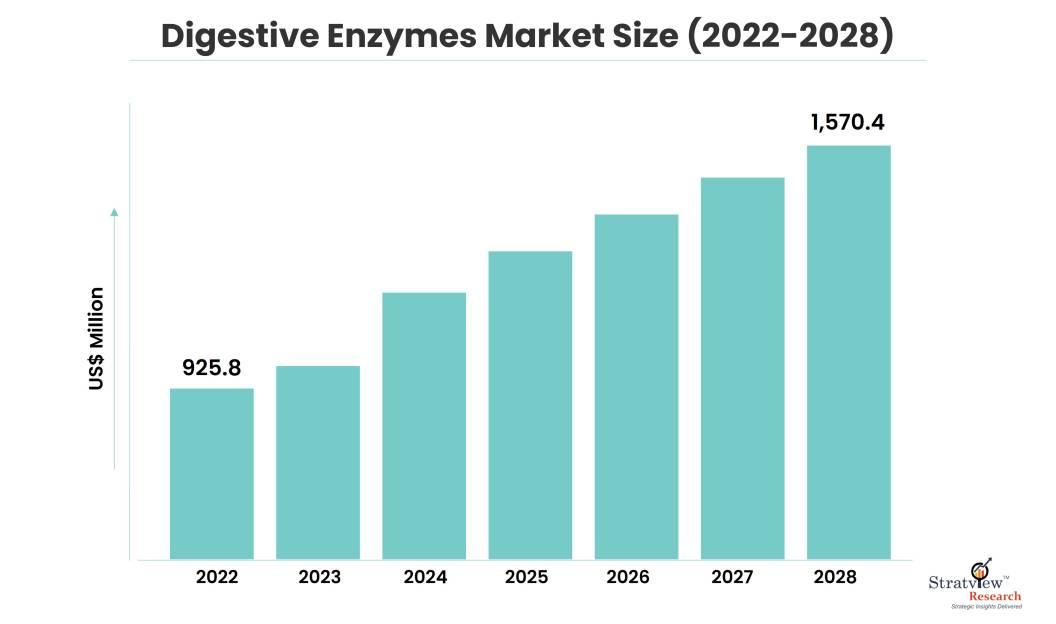Emerging Applications of Digestive Enzymes in Functional Foods and Supplements

Digestive enzymes play a crucial role in breaking down the complex molecules in our food into smaller, more absorbable components. The digestive enzymes market is estimated to grow from USD 925.8 million in 2022 to USD 1,570.4 million by 2028 at a healthy CAGR of 9.2% during the forecast period.
Traditionally, these enzymes have been associated with digestive health and used as dietary supplements for individuals with digestive disorders. However, recent advancements in science and nutrition have opened up new horizons for the application of digestive enzymes in functional foods and supplements. This article explores the emerging applications of digestive enzymes in enhancing not only digestion but also overall health and well-being.
The Basics of Digestive Enzymes
Before delving into their emerging applications, it's important to understand the fundamental role of digestive enzymes. These enzymes are produced naturally in our bodies and assist in breaking down macronutrients like carbohydrates, proteins, and fats into smaller molecules like sugars, amino acids, and fatty acids, respectively. This process enables the body to absorb essential nutrients more efficiently.
Improved Nutrient Absorption
One of the emerging applications of digestive enzymes is their use in functional foods and supplements to enhance nutrient absorption. By supplementing digestive enzymes in certain foods or as standalone supplements, individuals can optimize the digestion and absorption of vital nutrients. This is particularly beneficial for people with digestive disorders like irritable bowel syndrome (IBS) or lactose intolerance, who may struggle with nutrient absorption.
Enhanced Protein Digestion
Protein is a critical macronutrient for muscle growth, repair, and overall health. Emerging research suggests that supplementing with proteolytic enzymes like bromelain and papain may enhance protein digestion. This can benefit athletes, bodybuilders, and individuals looking to increase their protein intake for various health goals. Incorporating these enzymes into protein-rich functional foods or supplements can contribute to better utilization of dietary protein.
Managing Inflammation
Inflammation is at the core of many chronic health conditions, including digestive disorders and autoimmune diseases. Certain digestive enzymes, such as serrapeptase and bromelain, have demonstrated anti-inflammatory properties. These enzymes can be incorporated into functional foods and supplements designed to support individuals dealing with inflammatory conditions, providing a natural and potentially more effective alternative to traditional medications.
Promoting Gut Health
A growing body of research highlights the importance of a healthy gut microbiome for overall well-being. Digestive enzymes can indirectly support gut health by improving digestion and reducing the stress placed on the gastrointestinal system. Additionally, enzymes like lactase can help individuals with lactose intolerance enjoy dairy products without discomfort, expanding their dietary choices and potentially supporting a diverse gut microbiota.
Weight Management
Digestive enzymes may also play a role in weight management. Lipase, for example, is an enzyme responsible for breaking down dietary fats. When included in weight management supplements or functional foods, lipase can potentially aid in the digestion and utilization of dietary fats, supporting efforts to maintain a healthy weight.
Reducing Food Allergies
Food allergies and intolerances are becoming increasingly prevalent. Emerging research suggests that digestive enzymes may help individuals with certain food allergies or intolerances by breaking down allergenic proteins or compounds, reducing the severity of allergic reactions. This could open up opportunities for the development of allergen-specific functional foods and supplements.
Conclusion
As our understanding of digestive enzymes and their diverse functions continues to evolve, so do their applications in functional foods and supplements. From improving nutrient absorption to managing inflammation, promoting gut health, aiding in weight management, and reducing food allergies, digestive enzymes offer a wide range of potential benefits for individuals seeking enhanced health and well-being.
However, it's crucial to consult with a healthcare professional before incorporating digestive enzyme supplements or functional foods into your diet, especially if you have underlying health conditions or are taking medications. As the science behind digestive enzymes progresses, we can expect to see even more innovative applications that harness the power of these natural enzymes to improve our overall health and quality of life.
- Art
- Causes
- Crafts
- Dance
- Drinks
- Film
- Fitness
- Food
- Jogos
- Gardening
- Health
- Início
- Literature
- Music
- Networking
- Outro
- Party
- Religion
- Shopping
- Sports
- Theater
- Wellness




